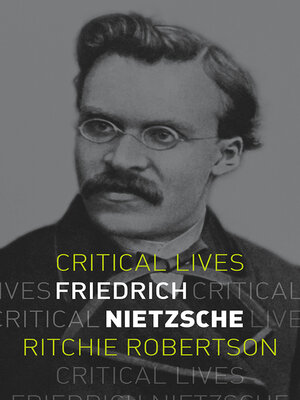
Sign up to save your library
With an OverDrive account, you can save your favorite libraries for at-a-glance information about availability. Find out more about OverDrive accounts.
Find this title in Libby, the library reading app by OverDrive.



Search for a digital library with this title
Title found at these libraries:
| Library Name | Distance |
|---|---|
| Loading... |
An accessible and informative study of the life and work of this vaunted German philosopher.
In this concise yet comprehensive critical biography, Ritchie Robertson examines the work of Friedrich Nietzsche within the context of his life. The book traces Nietzsche's development from outstanding classical scholar to cultural critic, who measured Imperial Germany by the standards of ancient Greece. It follows him on his path from a prophet (in the persona of Zarathustra) to a savage polemicist against modern liberal values, offering a "philosophy of the future." Robertson argues that Nietzsche's middle-period writings offer a subtle and searching analysis of his culture, more rewarding than the strident and often-controversial later works. The book also assesses Nietzsche's claim to be continuing the Enlightenment and shows that he valued reason, evidence, and fact, without which his historical case against Christianity would make no sense.
In this concise yet comprehensive critical biography, Ritchie Robertson examines the work of Friedrich Nietzsche within the context of his life. The book traces Nietzsche's development from outstanding classical scholar to cultural critic, who measured Imperial Germany by the standards of ancient Greece. It follows him on his path from a prophet (in the persona of Zarathustra) to a savage polemicist against modern liberal values, offering a "philosophy of the future." Robertson argues that Nietzsche's middle-period writings offer a subtle and searching analysis of his culture, more rewarding than the strident and often-controversial later works. The book also assesses Nietzsche's claim to be continuing the Enlightenment and shows that he valued reason, evidence, and fact, without which his historical case against Christianity would make no sense.







